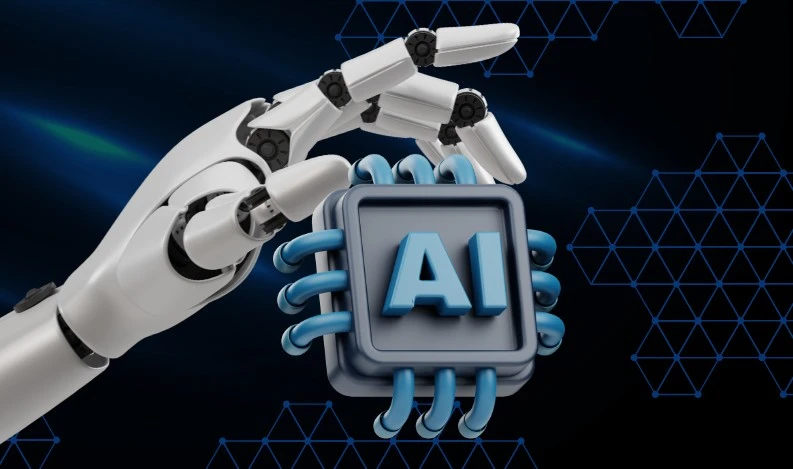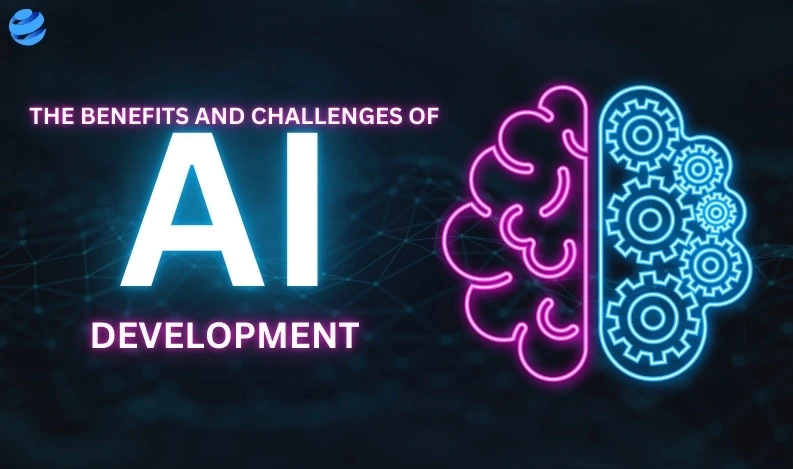Artificial Intelligence (AI) is a fascinating technology that is transforming our world. It has the potential to revolutionise many aspects of our lives. From simplifying everyday tasks to enhancing medical treatments, AI is making a significant impact. However, it also brings with it a set of challenges that we must address. In this blog, we will explore both the benefits and challenges of AI development.
Benefits of AI Development
AI Makes Tasks Easier
AI helps us complete tasks more efficiently. It can handle repetitive and mundane tasks, freeing up time for humans to focus on more creative and complex work. For instance, AI can automatically sort emails into different folders, saving us from the tedious task of organising our inbox. It can also quickly search for information on the internet, helping us find what we need in seconds.
AI Helps in Medicine
In the medical field, AI is a game-changer. Doctors use AI to diagnose diseases more accurately. For example, AI can analyse X-rays, MRIs, and CT scans to detect anomalies that might be missed by the human eye. This leads to earlier detection of diseases, which can be crucial for successful treatment. Moreover, AI aids in the development of new medicines by analysing large datasets and identifying potential drug candidates more efficiently than traditional methods.
AI in Education
AI is transforming education by making learning more interactive and personalised. It can create customised learning plans for students, catering to their individual strengths and weaknesses. AI-powered tools can generate quizzes and educational games, making learning fun and engaging. Additionally, teachers can use AI to grade assignments and provide instant feedback, helping students learn from their mistakes more quickly.
AI in Transportation
The transportation sector is witnessing significant changes due to AI. Self-driving cars, once a futuristic concept, are now becoming a reality. These cars use AI to navigate roads, avoid obstacles, and ensure passenger safety. AI also helps in managing traffic by analysing real-time data to optimise traffic flow and reduce congestion. This can lead to fewer traffic jams and a smoother driving experience.
AI in Daily Life
AI is integrated into many aspects of our daily lives. Our smartphones use AI to recognise our voices and respond to our commands. Virtual assistants like Siri and Alexa help us set reminders, play music, and answer questions. AI also powers recommendation systems on platforms like Netflix and Amazon, suggesting movies and products based on our preferences. This makes our lives more convenient and enjoyable.
Challenges of AI Development

Job Losses
One of the major concerns with AI development is job displacement. As AI systems become more capable of performing tasks that were previously done by humans, there is a risk of job losses. For example, AI can automate manufacturing processes, reducing the need for human labour. While this increases efficiency, it also means that many workers may lose their jobs. It is essential to address this issue by providing retraining and upskilling opportunities for those affected.
Privacy Issues
AI systems collect and analyse vast amounts of data. This data often includes personal information, raising concerns about privacy. There is a risk that this data could be misused or fall into the wrong hands. Companies and governments must implement stringent data protection measures to ensure that individuals' privacy is not compromised. Additionally, there should be clear regulations governing the use of AI to prevent abuse of personal data.
Dependence on AI
While AI can make our lives easier, there is a risk that we might become overly reliant on it. This dependence can lead to a loss of critical thinking and problem-solving skills. It is important to strike a balance between using AI as a tool and maintaining our ability to think independently. We should use AI to assist us, not replace our own cognitive abilities.
Errors in AI
AI systems are not infallible. They can make mistakes, sometimes with serious consequences. For example, an error in a self-driving car's AI system could lead to an accident. Similarly, AI used in medical diagnoses might misinterpret data, leading to incorrect treatment. It is crucial to have robust testing and validation processes in place to minimise the risk of errors. Additionally, there should be mechanisms to quickly address and rectify mistakes when they occur.
Ethical Concerns
The ethical implications of AI are a significant concern. AI can be used for malicious purposes, such as creating deepfake videos or conducting cyberattacks. There is also the potential for bias in AI systems, which can lead to unfair treatment of individuals based on race, gender, or other characteristics. It is important to develop ethical guidelines for AI development and use. These guidelines should ensure that AI is used responsibly and does not cause harm to individuals or society.
Conclusion
AI is a powerful technology with the potential to bring about significant positive changes in our lives. It can make tasks easier, enhance medical treatments, improve education, and revolutionise transportation. However, it also poses challenges such as job losses, privacy issues, dependence, errors, and ethical concerns.
To maximise the benefits of AI while minimising its drawbacks, it is essential to approach AI development and use responsibly. This involves implementing robust data protection measures, providing retraining opportunities for workers, and developing ethical guidelines. By doing so, we can harness the power of AI to create a better future for everyone.
AI is here to stay. It will continue to evolve and become an integral part of our lives. It is up to us to ensure that this evolution is guided by principles of fairness, transparency, and responsibility. By working together, we can make AI a force for good, enhancing our lives and solving some of the world's most pressing challenges.
Thank you for taking the time to read this blog. I hope it has provided you with a better understanding of the benefits and challenges of AI development. Let us embrace AI with caution and optimism, ensuring that it serves humanity in the best possible way.






















